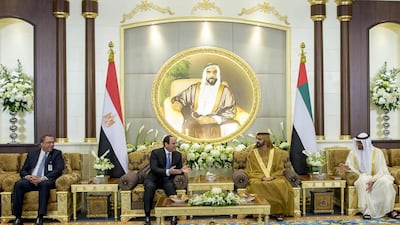Egypt’s president Abdel Fattah El Sisi has come calling at a particularly opportune time. In less than eight weeks, the Egypt Economic Development Conference kicks off in Sharm El-Sheikh. Mr El Sisi’s administration will have three days to persuade the region and the world that it’s worthwhile to invest in Egypt and that it will be, in the words of the conference literature, “a trusted partner”.
There is every indication that it won't be too much of a hard sell. In the four years since the uprising that forced the departure of Hosni Mubarak, Egypt has gone from messy revolution to measured restoration and much of the credit must go to Mr El Sisi. Soon after his election victory last May, his cabinet boldly raised fuel prices, a move that had proved too difficult for successive Egyptian governments. He tweaked the food-subsidy system to reduce waste and corruption in bakeries by means of "smart cards".
Despite scepticism from experts, he launched a project to double the capacity of the Suez Canal, one of the country’s main earners, and found Egyptians were enthusiastic about buying bonds to underwrite both the digging and a wider development scheme. He fed this sign of returning confidence with a visit to the Coptic Cathedral in Cairo, the first by an Egyptian leader since Gamal Abdel Nasser.
If, as was once said, nations are born in the hearts of poets but prosper or die in the hands of politicians, Mr El Sisi seems to have both the poetry and the prose just right. As he pragmatically told an audience of businessmen here, the Cairo government alone cannot meet the aspirations of the most populous Arab country. Other Arabs and foreign investors have a role. He is right and the UAE has already been doing much to help. Now, it is important for the wider world to recognise the extent of Egypt’s potential.
Spanning the north-east of Africa and the south-west corner of Asia and bordered by the Mediterranean, Egypt is a natural hub country – for manufacturing for export or indeed almost any other investment plan. Its geography is fortuitous but Egypt has many other advantages, not least the demographic dividend of an overwhelmingly young population. It has traditionally had a lead role within the region and beyond as an important and authoritative Arab voice. In many ways then, Egypt’s restoration project is just too big to fail.

